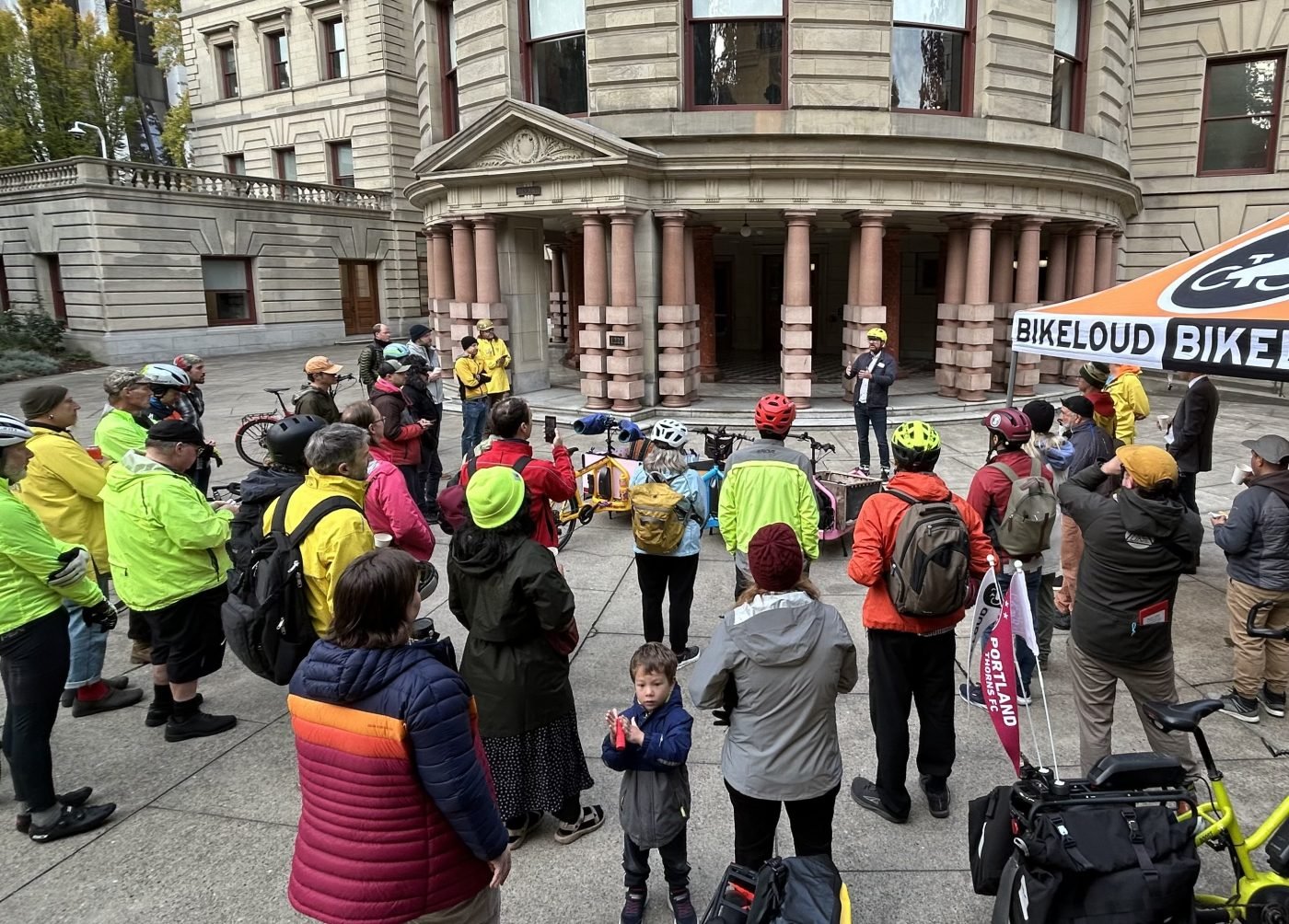
Dozens of cycling advocates rallied in front of Portland City Hall this morning with a message to “approve or improve” a legal settlement that’s already been negotiated by the nonprofit BikeLoud PDX and the City of Portland.
As I reported on Thursday, lawyers working for BikeLoud expected a hard-fought settlement — one that resulted from years of work on a lawsuit against the Portland Bureau of Transportation that claimed they have not followed a state law that requires the construction of bicycling facilities on major projects — would be approved by city council. When that approval didn’t happen, BikeLoud swung into action.
At stake are millions of dollars in cycling investments that the Portland City Attorney and PBOT’s executive team have already agreed to.
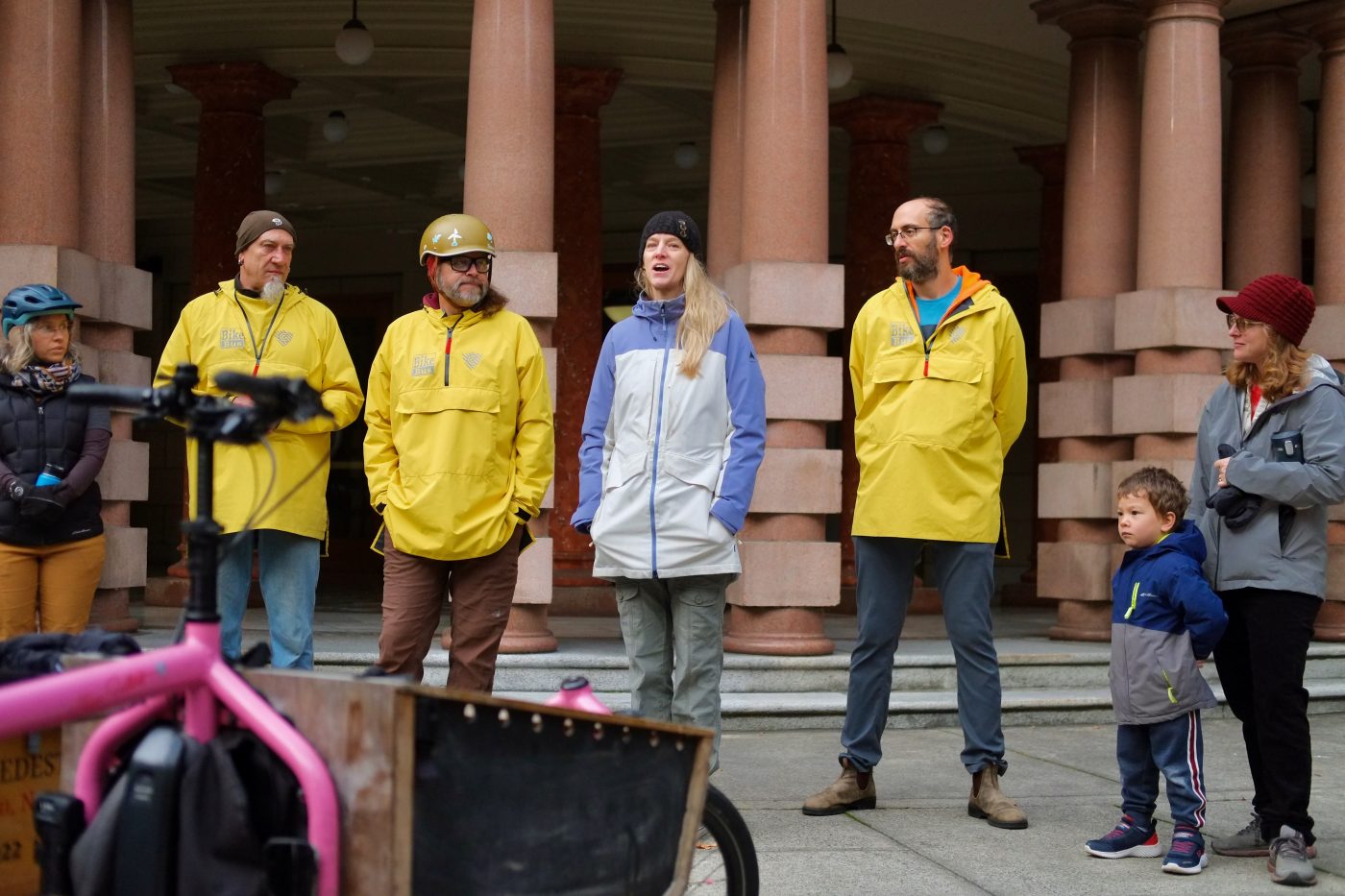
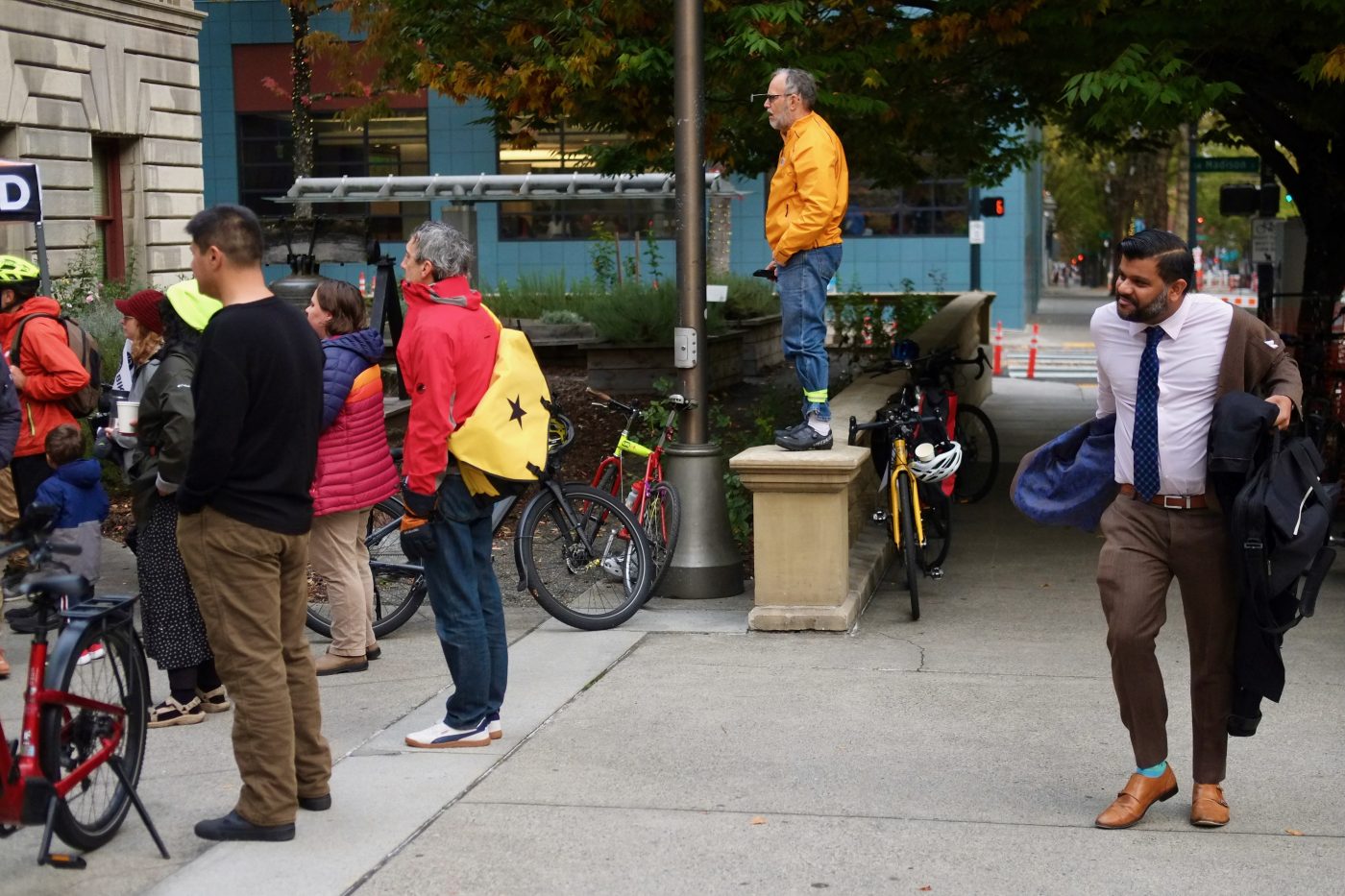
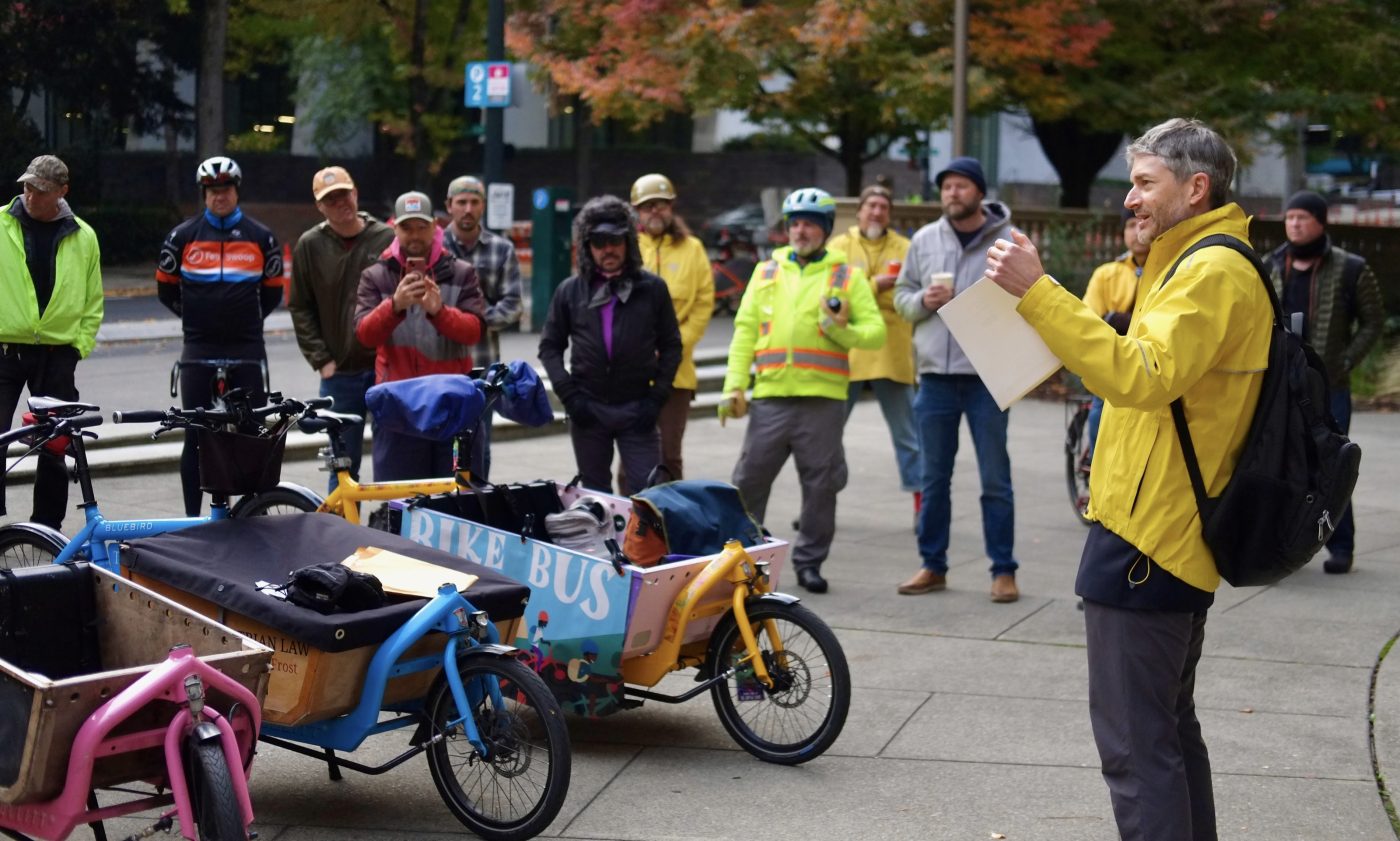
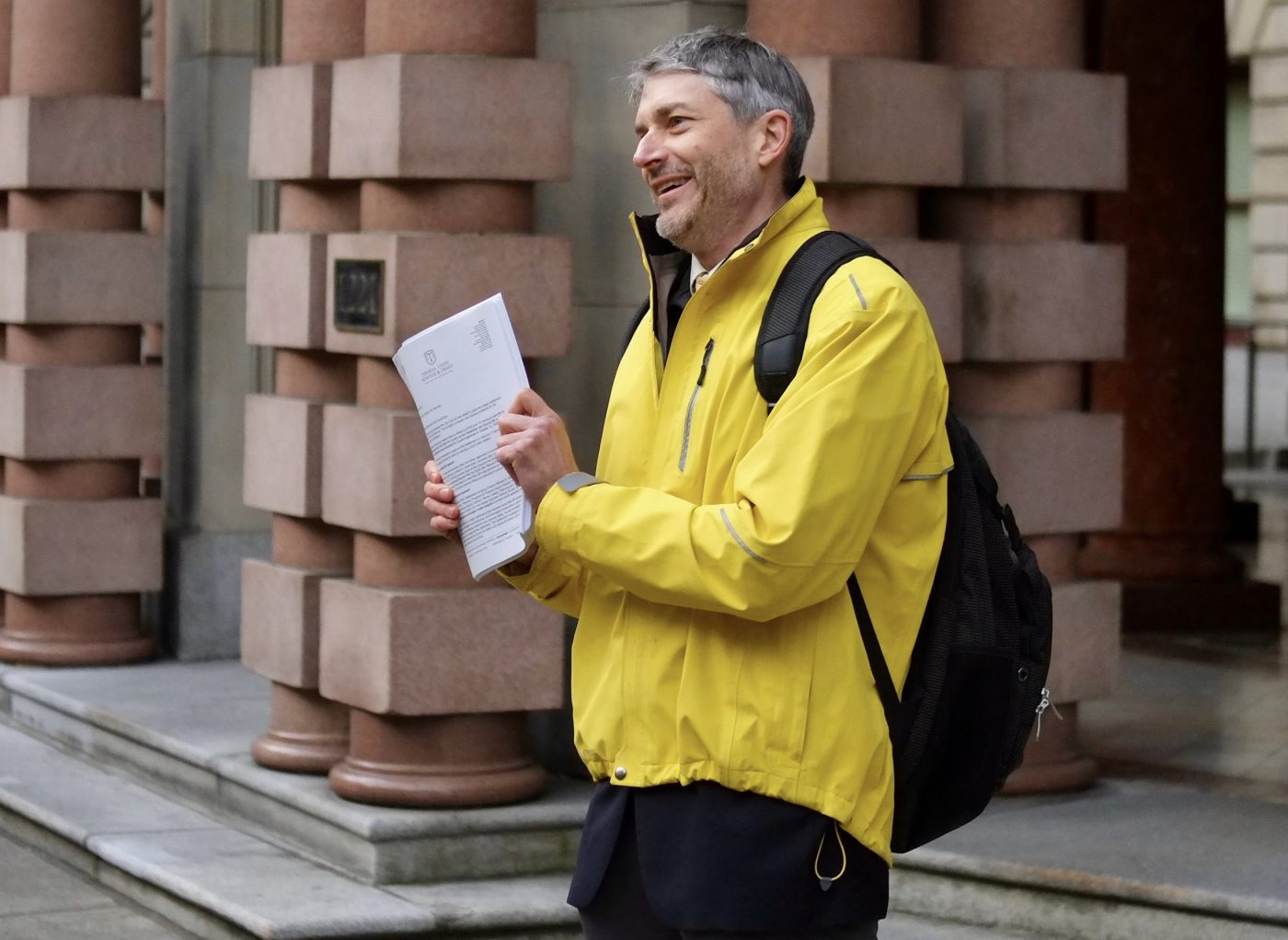
After speeches outside City Hall this morning Chris Thomas and Scott Kocher, the lawyers representing BikeLoud in the suit, walked into the building and delivered 12 copies of a letter to the City Attorney’s office that outlines the settlement and explains why Mayor Keith Wilson and members of city council should approve it.
“Council must act immediately to approve the Settlement or improve it. Failure to do so means a judge will decide the case by issuing a court order instead,” the letter reads. “Council must approve the settlement. The settlement is analogous to recent ADA settlements approved by Council to install curb ramps at corners, and to enforce sidewalk clearance around tents.”
The letter also outlines the settlement in more detail that had been previously available to the public.
Here are the settlement terms:
1. Match ODOT on Bike Bill Interpretation. Since 1971 the City has had no practice or procedures to implement the Bike Bill, and has never had a legal interpretation. As PBOT has noted, “The City does not have formal guidance related to the Bicycle Bill” and “this lawsuit is providing the opportunity to perhaps produce a more formal city-borne methodology.” The Settlement provides that methodology. It is a compromise, merely requiring Portland to match and implement ODOT’s interpretation, which originated with the state Attorney General. If Council changes anything about this term, it should be strengthened to make Portland a leader, not minimally match ODOT standards.
2. Bike Bus Greenways. The second major component of the settlement is $3 million to improve “Bike Bus Greenways.” These are the routes that parent-led groups of students use to commute to and from school. “Bike Buses” have expanded rapidly locally and worldwide. Prioritizing these locations city-wide maximizes return per dollar spent. The settlement directs that implementation follow the proposal that is in development by bike bus advocates, so their work is supported rather than disrupted.
3. Compromise on 82nd Ave. PBOT now owns 82nd Ave, and is spending over $200M on improvements including reconstruction. Instead of requiring full bicycle lanes on 82nd as the Bike Bill requires and City of Portland Bicycle Plan directs, the settlement includes a significant compromise: PBOT will pursue Business Access and Transit (“BAT”) lanes shared with bikes on the full length of 82nd. Private motor vehicles also have full use of the BAT lanes, except they must turn right at signalized intersections, reducing congestion in those lanes. BAT lanes will make transit more reliable and also dramatically increase pedestrian safety. (Note: Rumors that PBOT is replacing car lanes with bicycle lanes on 82nd are false.) Providing BAT lanes instead of separated bicycle facilities as BikeLoud believes the court would order in the lawsuit is a compromise for bikes that weighs heavily on BikeLoud. This compromise is the result of years of legal advocacy occurring alongside efforts by transit, pedestrian and safety advocates to achieve a safe and thriving corridor.
4. “Win-win” Locations. The settlement calls for two smaller investments that, like the Bike Bus Greenways, are intended to achieve the greatest benefit for relatively small additional expenditures:
- a. NE Sandy was identified because existing policy passed by Council designates NE Sandy as a Major City Bikeway, the highest classification, and because investment here leverages upcoming sewer projects. the City of Portland Bicycle Plan, calls for bike lanes but they currently dead-end at NE 14thAve. The Settlement extends bicycle lanes to 28th Ave, and funds a corridor study (for all modes) to connect to Sumner, Parkrose and nearby neighborhoods.
- b. SE Hawthorne was identified because PBOT has created but not implemented designs for safety improvements on routes parallel to SE Hawthorne. PBOT created these designs when the decision was made not to provide bike lanes on Hawthorne in 2021. Whether that 2021 project triggered the Bike Bill is a central issue in the lawsuit. Implementing the safety improvements that have already been designed but not implemented is the smallest financial component of the settlement, and is necessary to resolve the litigation.
Kocher and Thomas contend that the mayor and council has three options on what to do next: approve the settlement, improve the settlement, or fail to approve it. If the last option is the course taken by the City of Portland, the lawyers threaten that, “A judge will issue an order deciding the case. A court order will strictly apply the law, not look for “win-wins” or agreeable terms.”
The letter says the city has 14 days to respond.



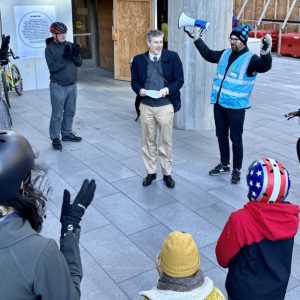

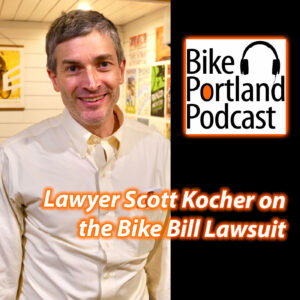
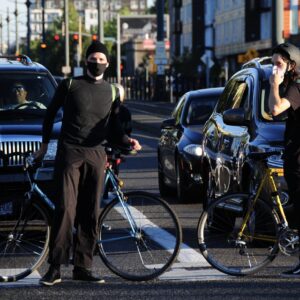
Thanks for reading.
BikePortland has served this community with independent community journalism since 2005. We rely on subscriptions from readers like you to survive. Your financial support is vital in keeping this valuable resource alive and well.
Please subscribe today to strengthen and expand our work.
Nothing in the settlement for any bike infra west of the river, right? The east side gets all of the bennies, as usual.
Seems like “terms” 1 and 2 apply to the west side as much as anywhere else. I think it behooves transportation activists to consider changes to our system holistically. I will support whatever improves the bikeways the most, regardless of location. Saying the westside needs more is great. Saying the east side is getting too much could be seen as counterproductive.
Point taken. SW Barbur is a very close analog to NE Sandy. It doesn’t have a current project or study at the stage of the one on NE Sandy but an administration with a strong alternative transportation agenda would see those big wide diagonals crossing the town, paralleling limited access motor roads, and know what to do.
barbur is still controlled by the state. it is a very important corridor for biking in Portland and something that BikeLoud is very interested in engaging on in the future.
IMO, the bennies ought to be proportional to where the original project that didn’t have bike facilities was: 82nd ought to benefit the neighborhoods immediately nearby (72nd-92nd); MLK/McLaughlan the near east side; and so on. There’s plenty for NW and inner SW, and I’m sure as they dig deeper into the projects list (what was published was just an initial list) they’ll find plenty for outer SW. If East Portland loses out (relatively) it will because the county and ODOT were pretty good about following the Bike Bill (compared to the City of Portland) prior to annexation.
The whole point of the settlement is to get the City to stop thinking about how to dole out individual projects that need to be fought over and negotiated one-by-one and start doing infrastructure by policy. That would benefit and bring new infrastructure to both sides of the river.
Regarding 82nd the settlement stipulates that:
If this is what comes to pass, and bikes are permitted to ride in the BAT lane, buses will be slowed to the speed of the cyclist in front of them. If a bus does manage to pass a cyclist, the cyclist will likely get out in front again at the next bus stop.
I support cyclists being able to ride in the BAT lane, which is far safer than the sidewalk, but it will be a disaster for the performance of the bus, which is already plenty slow enough.
FWIW my experience biking in transit lanes (Class 1 averaging 15mph) is that I’m usually stuck behind the bus and looking for an opportunity to pass it, not the other way around.
This will get better as we get more electric buses because at least there won’t be diesel exhaust. 82nd Ave. will be a challenge because the car lane will be busy. There will be places that are better for a fast biker to pass a slow bus and a little experience will help with that.
“This will get better as we get more electric buses”
2040 can’t come soon enough!
Yes. Riding with buses is the weak point of poaching the rose lanes. I’d support electrified bus lines but it doesn’t seem to be on the table.
Electric buses are on the menu, but not for another 15 years. Take that, climate change!
I’ve always thought 82nd, 122nd, inner Powell, and outer Division were ideal for a Vancouver-style Bee-Line bus system whereby there’s the usual local bus stopping every block or every other block, but there’s also a second bus line with different color buses that stop every half-mile or so, called the Bee-Line; when they leave their stop, they pull out into the leftmost lane until they get to their next stop. It’s an express bus, but it only works on 4 or 6 lane stroads and only in conjunction with a separate local service.
https://www.oregonlive.com/portland/2025/10/jewish-newspaper-shut-out-of-portland-city-councilors-press-conference-on-israel.html
I saw this today, our city councilors have more issues to deal with than local transportation issues so Bikeloud needs to Understand and be patient about this issue before they file their lawsuits.
They need to wait for Peace in the Middle east.
Mitch Green and the others grifting with junkets is only matched by their anti-semitism.
Its embarrassing.